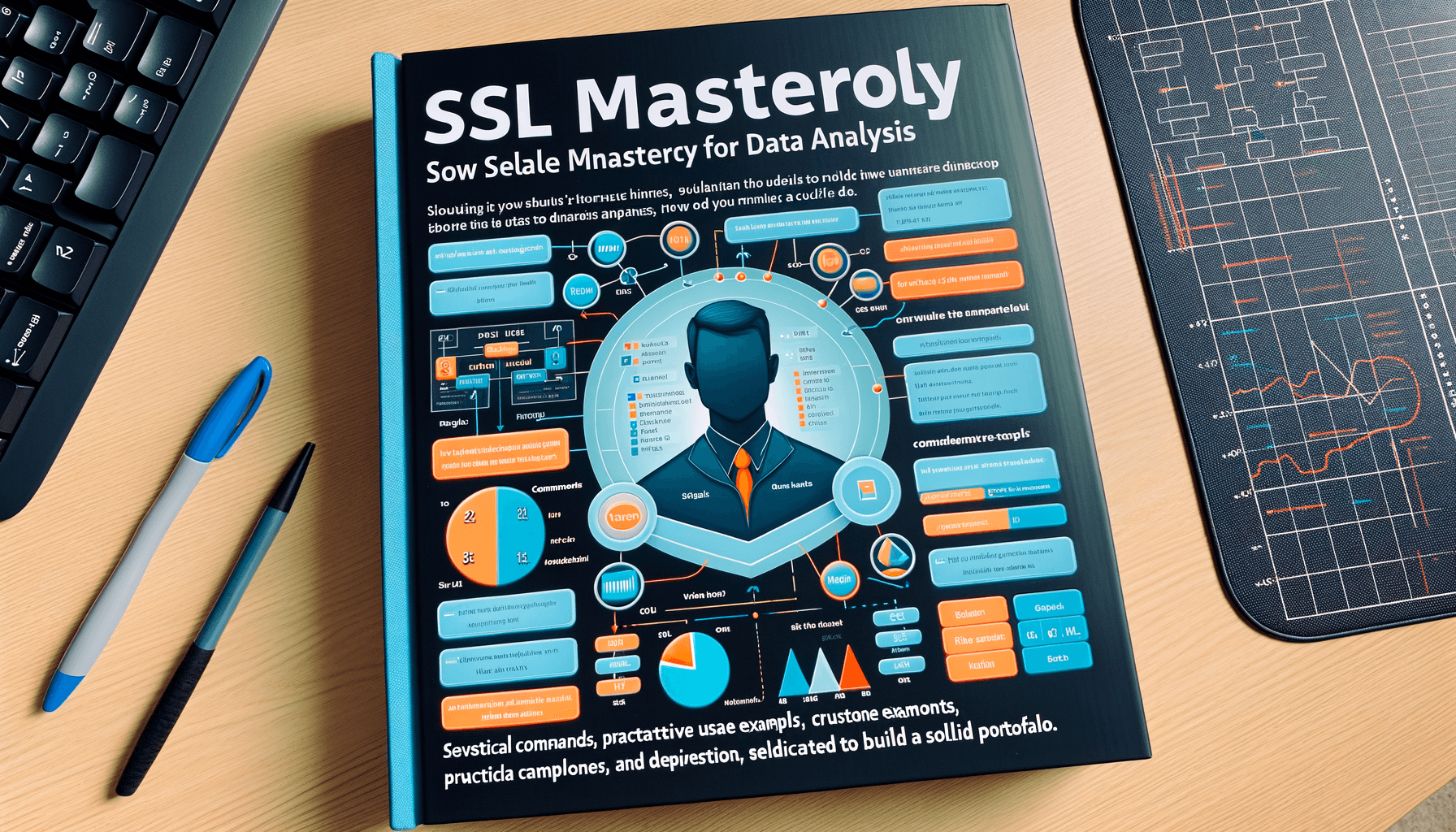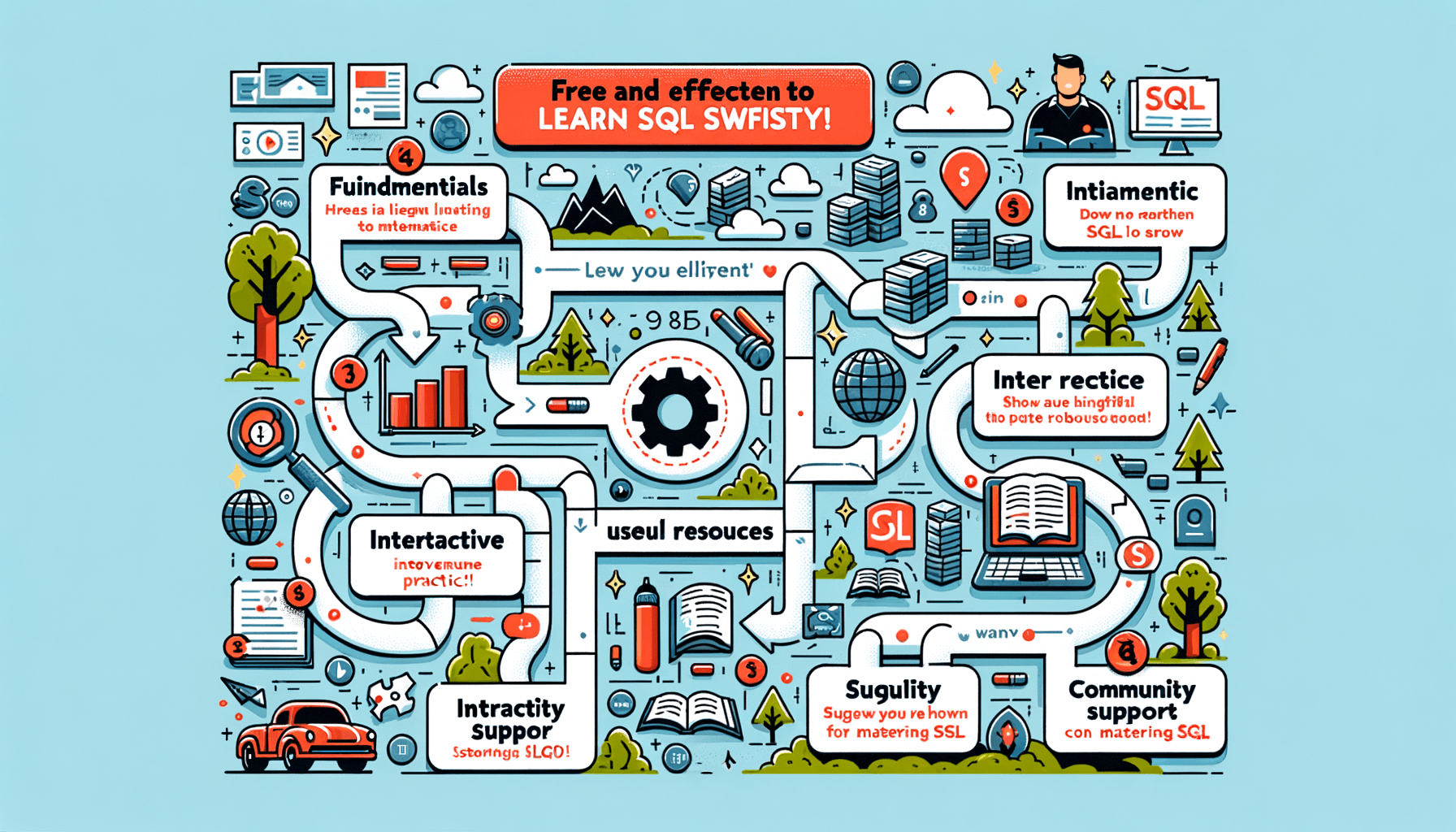A big variety of articles and resources

Essential SQL Skills for Data Entry Professionals
 Sia Author and Instructor
Learn SQL
Sia Author and Instructor
Learn SQL
9 minute read
Understanding the Basics of SQL for Data Entry
Basic SQL Syntax
To grasp any programming language, one must first become proficient in its syntax. In SQL, this involves acquiring the knowledge of how to create a query that retrieves relevant information by using basic SELECT and FROM commands. Since SQL is a language that requires accuracy and precision, even minor syntax mistakes can result in major issues, it is essential to learn how to avoid these errors. Understanding SQL syntax is the first step towards effective data entry.
Data Types and Structures
SQL supports various data types and structures that are essential for accurately entering and storing data. Knowing the differences between types such as integers, strings, and dates is crucial. Additionally, understanding how tables are structured and how data is related within the database will enhance your ability to manage and query data effectively.
Querying Data
Querying data is a fundamental skill for any data entry professional. Learning how to construct queries that can filter, sort, and extract data is vital. This skill allows you to interact with the database to retrieve the information needed for your tasks. Mastering query construction will significantly improve your efficiency and accuracy in data entry.
Intermediate SQL Techniques for Enhanced Data Management
Join Operations
Understanding how to effectively use join operations is crucial for managing complex data relationships. Mastering different types of joins such as INNER, LEFT, RIGHT, and FULL can significantly enhance your data querying capabilities. This knowledge allows for a more nuanced data retrieval, essential for comprehensive reports and analytics.
Subqueries
Utilizing subqueries is a fundamental skill for any SQL user looking to perform advanced data analysis. Subqueries, which are queries nested within another query, help in breaking down complex problems into simpler parts. This technique is particularly useful in filtering or evaluating data before performing a main query.
Data Aggregation
Data aggregation is key in summarizing detailed datasets into meaningful information. Techniques like GROUP BY, COUNT, SUM, and AVG play a vital role in this process. By aggregating data, you can provide insights and support decision-making processes more effectively. Learning to aggregate data efficiently is an essential skill for enhanced data management.
Advanced SQL Skills for Data Analysis
Complex Query Optimization
Optimizing SQL queries is crucial for handling large datasets efficiently. Understanding how to reduce the load on the database through effective indexing and query restructuring can significantly enhance performance. Mastering complex query optimization can lead to quicker data retrieval and more responsive applications.
Using SQL Functions
SQL functions are powerful tools for data manipulation and analysis. Learning to use built-in functions like SUM(), AVG(), and custom functions can automate and simplify complex data operations. This skill is essential for data analysis and helps in transforming raw data into insightful information.
Advanced Data Manipulation
Advanced data manipulation involves techniques beyond basic CRUD operations. It includes data merging, handling data discrepancies, and using SQL for data preparation and quality improvement. These skills are vital for deep data analysis and can be enhanced through practical exercises and AI assistance.
SQL Best Practices for Data Entry Professionals
Code Efficiency
Efficient SQL code is crucial for optimizing performance and reducing processing time. Ensure that your queries are well-structured and avoid unnecessary complexity. Use indexes wisely and always test your SQL queries for speed and efficiency.
Error Handling
Proper error handling in SQL can prevent data corruption and loss of data integrity. Implement robust error-checking mechanisms and use transactions to ensure data consistency. Always validate data before entry to minimize errors.
Security Measures
Security is paramount when handling sensitive data. Implement strong access controls and use encryption to protect data at rest and in transit. Regularly update your SQL server and its components to protect against vulnerabilities.
By adhering to these best practices, data entry professionals can ensure that their SQL operations are not only efficient but also secure and reliable.
Tools and Software to Enhance SQL Skills
Popular SQL Database Management Systems
Choosing the right SQL database management system is crucial for efficient data handling. Popular systems include MySQL, PostgreSQL, and Microsoft SQL Server. Each offers unique features that cater to different needs, such as scalability, security, and ease of use.
Integration with Other Data Tools
Effective SQL skill enhancement often requires integration with other data tools. For instance, SQL can be seamlessly integrated with Python for advanced data analysis or with Excel for simpler data manipulation tasks.
Automating Tasks with SQL
Automation is key to enhancing productivity. With SQL, routine tasks such as data backups, report generation, and data validation can be automated using scripts. This not only saves time but also reduces the likelihood of human error.
Developing Problem-Solving Skills with SQL
Identifying Data Patterns
Identifying data patterns is crucial for effective data management and problem-solving. By recognizing trends and anomalies in data, SQL professionals can make informed decisions and enhance data-driven strategies. Using SQL queries to sift through large datasets helps in pinpointing these patterns, which is essential for predictive analytics and operational improvements.
Handling Data Discrepancies
When discrepancies arise, it's vital to address them promptly to maintain data integrity. SQL provides tools and commands to effectively compare and reconcile data, ensuring accuracy and consistency. Handling these discrepancies involves a detailed analysis and often a step-by-step approach to trace and correct the errors. Attention to detail is paramount in this process.
Optimizing Data Entry Processes
Optimization of data entry processes using SQL involves streamlining operations to reduce errors and increase efficiency. Techniques such as automating data validation checks and using SQL scripts to perform bulk updates are common practices. This not only speeds up the data entry process but also minimizes the likelihood of data entry errors, leading to more reliable data management systems.
The Role of SQL in Data Privacy and Regulation Compliance
Understanding Data Privacy Laws
SQL plays a critical role in ensuring that data handling practices comply with various data privacy laws. By using SQL, professionals can structure queries to selectively access data, ensuring that only necessary information is retrieved and exposed. This is particularly important in industries where data privacy is paramount, such as healthcare and finance.
Implementing Data Protection Measures
To safeguard sensitive data, SQL provides mechanisms such as encryption and access controls. These tools help in implementing robust data protection measures, ensuring that data is not only secure but also accessible only to authorized personnel. Implementing these measures effectively can significantly reduce the risk of data breaches.
SQL and Compliance Reporting
SQL is indispensable for generating compliance reports that are often required by regulatory bodies. By leveraging SQL's capabilities, organizations can automate the extraction and compilation of compliance data, making the reporting process more efficient and less prone to errors. The use of SQL thus not only supports compliance but also enhances the overall integrity of data management systems.
Continuing Education and Resources to Learn SQL for Data Entry
Online Courses and Certifications
To stay competitive in the field of data entry, it is crucial to continuously update and refine your SQL skills. Online courses and certifications offer a flexible and comprehensive way to do this. They cover everything from basic syntax to advanced data manipulation techniques, often culminating in a certification that can enhance your resume.
Books and E-books
Books and e-books serve as valuable resources for both beginners and experienced SQL users. They provide detailed explanations and examples, which can be revisited as often as needed. This format is particularly useful for those who prefer self-paced learning outside of a structured course environment.
Community Forums and Groups
Engaging with community forums and groups is an excellent way to learn from experienced professionals and peers. These platforms allow for the sharing of knowledge, troubleshooting of common issues, and discussion of the latest SQL trends and best practices. They are also a great place to seek advice on career advancement and to stay informed about new SQL resources and opportunities.
Bold participation in these communities can significantly enhance your learning experience and professional growth in SQL.
Conclusion
In conclusion, mastering SQL skills is indispensable for data entry professionals at all levels. From entry-level to senior positions, the ability to efficiently manipulate and manage data using SQL can significantly enhance productivity and accuracy in data-related tasks. As the demand for skilled data handlers grows, those equipped with robust SQL skills will find themselves at a competitive advantage in the job market. Whether it's through basic SQL syntax or advanced data manipulation techniques, continuous learning and skill enhancement in SQL are crucial for career advancement in the data entry field.
Frequently Asked Questions
What are the emerging skills for data entry specialists today?
Today, data entry specialists need to be proficient in data management software, understand data privacy regulations, and have a grasp of database structures. Skills in data cleaning, validation, and familiarity with automation tools and basic scripting are crucial. Competence in using cloud-based data management systems is also increasingly important as remote work becomes more common.
Are your basic SQL skills limited only to data jobs?
Basic SQL skills are applicable to a wide range of careers beyond traditional data jobs. As data becomes more integral to business operations, the potential career paths for individuals with SQL skills continue to expand, including roles in web development, application development, and more.
What are SQL skills?
SQL skills enable professionals to work efficiently with Relational Database Management Systems (RDBMS). These skills include the ability to access, insert, modify, update, and manipulate data within a database, which is essential for various programming and data management roles.
Why are SQL skills important for data entry professionals?
SQL skills are crucial for data entry professionals because they enhance the ability to manage and analyze large datasets effectively. These skills allow for more accurate data handling, querying, and reporting, which improves data quality and decision-making processes within organizations.
How can SQL skills improve data entry processes?
SQL skills can significantly optimize data entry processes by enabling automation, efficient data querying, and error reduction. These skills help professionals handle data discrepancies, identify patterns, and implement data protection measures more effectively, leading to streamlined operations.
What are the benefits of continuing education in SQL for data entry professionals?
Continuing education in SQL helps data entry professionals stay updated with the latest database technologies and practices. It enhances their ability to handle complex data structures and queries, ensures compliance with data regulations, and improves their overall career prospects by keeping their skills relevant and in-demand.
Related Articles

10 Effective Tips on How to Learn SQL Online
9 minute read

A Comprehensive Guide to Learn SQL for Analysts
8 minute read


